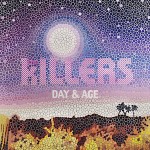 “Human,” the lead single from The Killer’s latest album Day and Age, poses a baffling question:
“Human,” the lead single from The Killer’s latest album Day and Age, poses a baffling question:
“Are we human, or are we dancer?”
Many were quick to point out that, although not all humans are dancers, most dancers are, in fact, humans. The two are not mutually exclusive, as this handy Venn diagram illustrates:
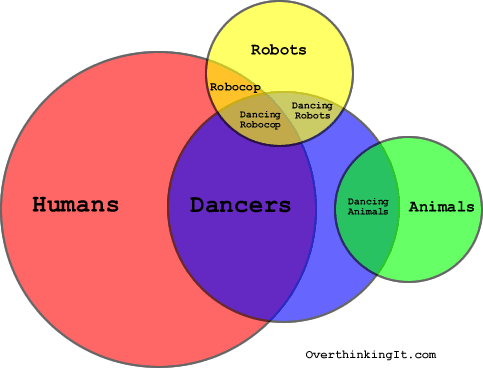
Honestly, I've never known a Venn diagram to be anything but handy.
“Human or Dancer” is only one example of the many false dichotomies found in pop music. More logical fallacies, after the jump.
50 Cent, Get Rich or Die Tryin’
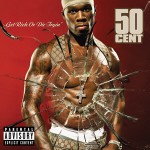 Though the phrase “get rich or die tryin'” doesn’t appear in any of the lyrics to 50 Cent’s songs, its use in his debut album and the feature film based on his life have made the phrase an integral part of Fiddy’s persona. “Get rich or die tryin'” assumes that the life of someone like Fiddy has only two possible outcomes: getting rich, or dying while attempting to reach that status.
Though the phrase “get rich or die tryin'” doesn’t appear in any of the lyrics to 50 Cent’s songs, its use in his debut album and the feature film based on his life have made the phrase an integral part of Fiddy’s persona. “Get rich or die tryin'” assumes that the life of someone like Fiddy has only two possible outcomes: getting rich, or dying while attempting to reach that status.
However, even if one assumes that Fiddy’s ethos permits no other life goal besides “getting rich,” this is still a false dichotomy. Consider the scenario in which one attain great wealth, loses said wealth, and dies while trying to regain wealth. Here, “getting rich” was a discreet event as opposed to a permanent status. Fiddy may think that in “getting rich,” he will stay rich, but history has taught us that this is not always the case:
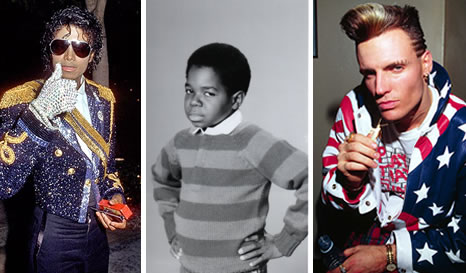
They still have time to die trying.
Black Sabbath, “Iron Man”
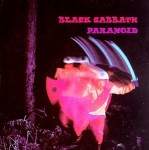 This song, a tale of a man who “traveled time/for the future of mankind,” packs three false dichotomies in a row. After he travels back in time and appears in the present, people wonder:
This song, a tale of a man who “traveled time/for the future of mankind,” packs three false dichotomies in a row. After he travels back in time and appears in the present, people wonder:
Can he see or is he blind?
Can he walk at all,
Or if he moves will he fall?
Is he alive or dead?
1. “Can he see or is he blind?”
Blindness can refer to the “complete lack of form and visual light perception” (No Light Perception, or NLP), but this only applies to about 10 percent of those considered legally blind. The rest can see, a little bit, just not well. Therefore, one can be blind as well as be able to see.
2. “Can he walk at all/Or if he moves will he fall?”
Plenty of people who can’t walk (that is, move themselves with the motion of their two legs), are still capable of mobility without falling:
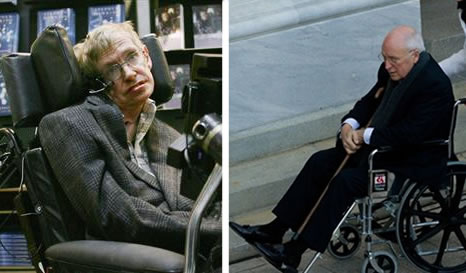
OverthinkingIt.com: probably not ADA compliant anymore.
3. “Is he alive or dead?”
Although “death” is typically thought of as a permanent state, there are several scenarios in which someone who is apparently “dead” can be brought “back to life,” via CPR or other means. And since the song belongs squarely in the realm of science fiction, things like zombies and vampires (the living dead) are totally on the table.
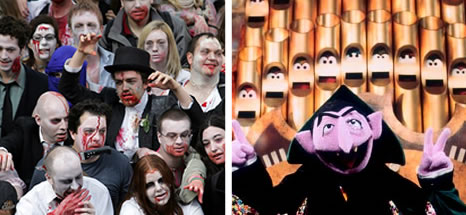
"Braaaains! Blah."
Team America: World Police, “Freedom Isn’t Free”
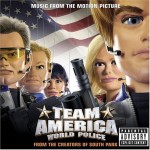 The morally unambiguous world of Team America: World Police has no shortage of false dichotomies. There are good guys (those who fight terrorists) and there are bad guys (those who are terrorists themselves or those who aren’t tough enough against terrorists). You’re either with us, or against us (wait, that’s real life…never mind). Along those lines, the song “Freedom Isn’t Free” poses this false dichotomy to those who are asked to fight for freedom:
The morally unambiguous world of Team America: World Police has no shortage of false dichotomies. There are good guys (those who fight terrorists) and there are bad guys (those who are terrorists themselves or those who aren’t tough enough against terrorists). You’re either with us, or against us (wait, that’s real life…never mind). Along those lines, the song “Freedom Isn’t Free” poses this false dichotomy to those who are asked to fight for freedom:
“Will you answer the call, or run away like a little pussy?”
There are, in fact, multiple alternatives to answering the call to fight for freedom that do NOT involve running away like a little pussy:
- Advocating for non-violent solutions to conflicts
- Conscientious objection
- Voting for the war before voting against it
- Running away like a big dick
The Clash, “Should I Stay or Should I Go”
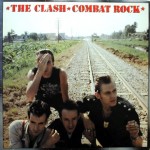 The narrator of this song, beset with crippling indecision, asks his “darling” how she would like for him to proceed: “Should I stay or should I go?” He presumes there are only two possible courses of action in this relationship (staying or going), both of which will result in trouble. (Un)fortunately for him, the couple actually has many options:
The narrator of this song, beset with crippling indecision, asks his “darling” how she would like for him to proceed: “Should I stay or should I go?” He presumes there are only two possible courses of action in this relationship (staying or going), both of which will result in trouble. (Un)fortunately for him, the couple actually has many options:
- Let’s take a break.
- Let’s just be friends.
- Let’s just be friends with benefits.
- I know you’re only telling me to go because you’re too proud to admit that you really need me.
- I know you’re only telling me to stay because you’re too weak to make it on your own.
- That’s it. We’re through, broken up, except when I’m in town every few months, am drunk, and haven’t been laid since the last time I saw you.
Meatloaf: “Paradise By the Dashboard Light”
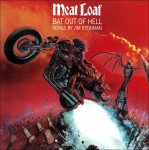 The baseball sequence in this song leaves little ambiguity as to the context: boy meets girl, boy wants to have sex with girl, girl wants promise of commitment, nay, marriage, before consenting to sex. She asks a cut-and-dry question:
The baseball sequence in this song leaves little ambiguity as to the context: boy meets girl, boy wants to have sex with girl, girl wants promise of commitment, nay, marriage, before consenting to sex. She asks a cut-and-dry question:
“What’s it gonna be boy: yes or no?”
This may appear to be an actual dichotomy: the girl seems adamant that unless the boy says he loves her and promises to marry her, she will not have sex with him tonight.
BUT: remember the baseball analogy? The play-by-play states that the situation is “two down (out), nobody on, no score, bottom of the ninth.” The runner is trying to steal home and win the game. If he’s safe at the plate, then game over, he wins. If he’s out, though, he doesn’t necessarily lose. Instead, the game goes to EXTRA INNINGS.
The boy realizes this and tries to postpone the decision by sleeping on it and getting back to the girl in the morning. (This makes this song unique in that it internally acknowledges the false dichotomy.) Unfortunately, logic is no match for hormones. Our narrator says yes, swears upon his mother’s grave, and now wishes for the apocalypse to come.
Readers: hit the comments and show me other examples of false dichotomies in music.
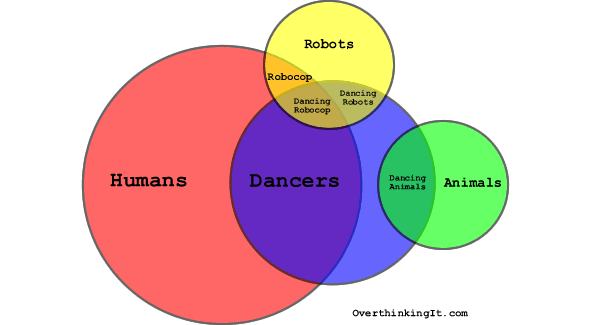
“Get Rich or Die Tryin'” is a variant of the classic gangsta dichotomy “Ride or Die.” The most notable artist to invoke this dichotomy was Tupac Shakur, who in several senses died while riding.
I puzzled over “are we human or are we dancer” for a while…then the Internets told me that Brandon Flowers says that Hunter S. Thompson said that Americans are “raising a generation of dancers” when asked about the direction of the country, with the kids and such. The implication there was that we’re teaching people to be followers, puppets, people whose output is wholly dependent on someone else’s input.
The imagery matches in the other lyrics, too: “cut the cord … my sign is vital, my hands are cold” …
Unfortunately, because so many dang people asked (asked Brandon Flowers, asked the Internets, asked MTV, asked Rolling Stone, etc.) what the hell they meant by “Are we human or are we dancer,” I can’t seem to find any reference to the actual Thompson quote…and I can’t tell whether it even exists.
But the upshot is that there’s a possibility that this particular dichotomy isn’t as false as it sounds. The question actually is: are we capable of thinking, acting, and feeling for ourselves or are we empty and puppet-like, with someone else pulling the strings?
Thank you, Melanie, for invoking the late, great doctor. Now that I’ve heard an explanation for the lyrics, I find I like the song even more.
Well, there are a few false dichotomies in the Beatles catalog. In terms of single songs, the band asked about Love vs. War while there were many who attempted to do both simultaneously (in fact, in a sick way, many of the people waging the war saw it as a duty towards the Vietnamese). They also forced us to say either goodbye or hello, when we may have wanted to say, I’ll see you in a few minutes, or Don’t leave, I just need to use the loo.
Of course, the most interesting dichotomy spreads over not just two songs, but albums. On their US debut, With the Beatles, we are told that it is ‘Money (All I Want)’ that makes the band happy. Yet only an album later in A Hard Day’s Night, we are told that you ‘Can’t Buy Me Love.’ Not only are these two contradictory philosophies that negate one another directly in both lyrics and themes, they are both advocated by the same band! Not only do the Beatles give us false choices, but hypocrisy and double-speak as well! Next, Paul will be telling fans that we’re either “with him or against him” a la ex-President Bush. Damn you Paul, you continue to play with my emotions!!!
If one assumes Mr. 50 Cent’s life goal is to become rich, there is no false dichotomy as described. It is only in assuming that he wants to stay rich that there is a problem. Perhaps what 50 is saying that if he ever slips back into the middle or lower classes, he will simply live out the rest of his days peacefully as a relative pauper.
What he does not recognize, however, is the possibility of being rendered unable to try to get rich, but not killed, such that when he dies he does not “die trying”. Perhaps if he was in a coma or something.
Doesn’t the “or” in Fiddy’s alleged dichotomy indicate that the separation you already admitted between “getting rich” and “dying” makes it not a dichotomy but two outcomes? And to further complicate your Fiddy reference, the “or” does make the two aspects discreet events, so the example you gave of the person that dies while trying to re-acquire wealth indeed works- “Get rich OR die trying,” is the phrase- the person in your example died trying to get rich, it just happened to be the second time they tried. So sorry, I don’t think “get rich or die trying” is a false dichotomy at all- it’s Fiddy’s personal philosophy on life.
“Iron Man,” what if Ozzy was going for the metaphorical sense of each description?
Modest Mouse, from “Satan in a Coffin”: “You were lying on the carpet like you’re Satin in a coffin/ You said, “Do you believe what you’re sayin’?”/… Are you dead or are you sleepin’?/ God I sure hope you are dead.” Why is it a dichotomy? Well, barring the ramifications of “God” being the object and not someone the singer knows, the person “on the carpet” speaks to the singer- they aren’t dead OR sleeping, unless we are to assume they spoke long enough before the song to fall asleep or die.
ALL of “Opposites Attract” by Paula Abdul is, in a sense, a false dichotomy if you take the video into consideration: her male counterpart is a cartoon character- and a cat, at that. They can’t actually BE “opposites” or “attract,” since he doesn’t exist.
Coldplay, “Yellow”: “I swam across/ I jumped across for you.” You can’t swim AND jump across the same line. You may be capable of jumping across a line into water and swimming, or even vice-versa, but they cannot be simultaneous.
Humans are animals. Your Venn diagram is flawed.
@Mark – There is NOTHING flawed about that Venn diagram, except that it does not include a link to a video of Robocop dancing. Awesome work, lee.
And where’s the robotic dancing animals intersection?
http://gadgetfind.com/robot.html
this kind of makes this whole article void… but i’m pretty sure the lyric is “are we human or are we denser?”